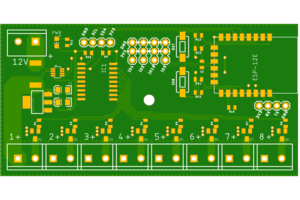This is a project that uses an ESP8266 to drive 8x MOSFET power ports, rated at 2A each. It incorporates a GPIO buffer (based on MCP23008) to allow the MCU to reboot without changing the port status, and a current sensor (based on INA219) to measure total current through the device.
The schematic and board layout are in the eagle/ directory. You can order this board from Oshpark.
Logical components in the hardware are:
- An LDO that steps down 12V input to 3.3V, with power LED
- An INA219 on I2C that senses current using a 0.01 Ohm shunt resistor (32A max in 80mA steps)
- An MCP23008 8-port GPIO expander on I2C
- 8 output ports, driven by IRLML6244 mosfets (3A max per channel)
- An ESP8266-12E which drives the current sensor and GPIO expander over I2C
- RST and GPIO0 are provided via pushbuttons
- Headers:
- I2C breakout for additional sensor(s)
- 4x GPIO breakouts (GPIO: 4, 5, 9, 10)
- Serial access to flash the ESP8266
Bill of materials with components and sizes:
- AM1117-3.3V
- C1, C2: 10uF Tantalum (3216)
- C3: 470pF ceramic (0805)
- IC1: MCP23008 (SO18W)
- IO0/RST: momentary switch (6mm x 3.5mm)
- J1-J9: screw terminal (0.2" pitch)
- J10,J11: 4-pin standard header (0.1" pitch)
- J12-15: 3-pin standard header (0.1" pitch)
- MDL1: ESP8266-ESP12E
- PWR: Green LED (0805)
- Q1-Q8: IRLML6244 (SOT23)
- R1-R8: 1kOhm (0805)
- R9-R10, R12-16: 10kOhm (0805)
- R11: 330Ohm (0805)
- R17: 0.01Ohm Shunt (2515)
- U1: INA219 (SOT23-8)
We use drivers for INA219 and MCP23008 which are readily available for Mongoose OS. For telemetry export, we use Prometheus to export metrics including standard telemetry from the ESP8266 as well as custom metrics such as port state, current and voltage.
Using the Mongoose OS RPC Subsystem, we expose a simple control surface to query the ports, switch them on/off or toggle them.
By default, HTTP endpoints are provided for metrics and RPCs, which can be a security hazard. For non-trusted wifi environments, we allow allow the device to close all serving ports and service RPCs via Pubsub using TLS connections to a remote Mosquitto endpoint. Metrics can be pushed via POST requests to a Prometheus pushgateway.
Firmware updates can be performed over-the-air, using both HTTP as well as MQTT transport.
